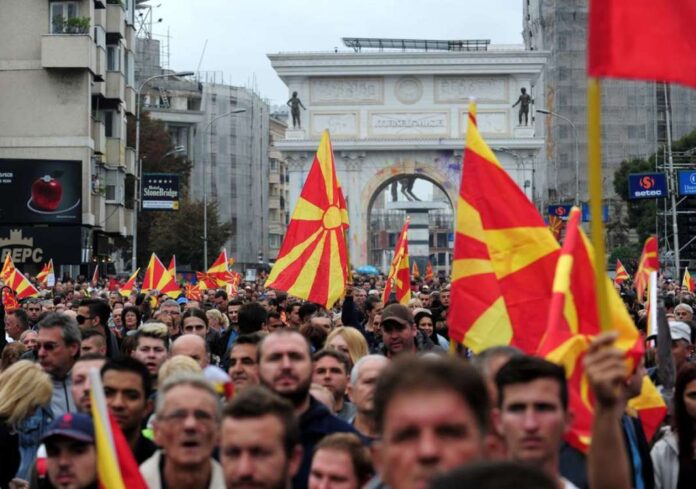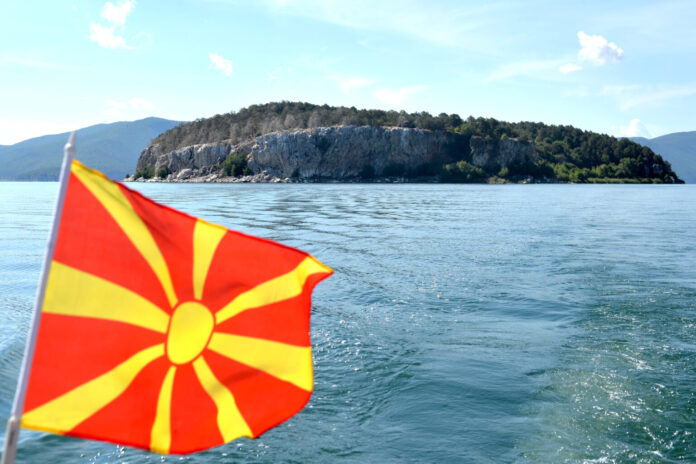Chauvinists from Greece do not recognize Macedonian language, Macedonian history, Macedonian symbols and identity …

On May 25, 1945, a Greek military unit, stationed in the village of Smrdesh, Kostur Region, in Aegean Macedonia, today in Greece, beat up more men and women from the same village and forbidden the population to speak Macedonian. Sources for the newspaper « Nova Makedonija » (Macedonians from Aegean Macedonia, who insist on remaining anonymous) claim that « a ban on the use of the Macedonian language happened this May, 80 years after the unfortunate event in Smrdesh, Kostur Region. With no physical incidents this time »…
The scandal on May 25, caused by Athens AEK, and the European handball final in Macedonia are not a lonely incident in history
Like every year, this year, Macedonians in the small town of Sorovichevo, in Greek, renamed Amanteo, planned to hold the usual fair on May 21, when the Day of Saints Constantine and Elena is celebrated as Sorovichevo’s glory. The fair and fame were banned. Although the ban, issued by the municipality, is not at all a matter of language, however, Macedonian residents from Sorovichevo say that the use of the Macedonian language, as well as fulfilling songs of fame, was a reason to prevent this, as they emphasize, primarily a cultural event. These two events, one of 1945, and the other from 2025, reacted the issue of the treatment of the Macedonian language in Aegean Macedonia, in Greece. Part of this file is the case when the Greek authorities on December 15, 1945 in the Kostur village of Nestram, in Aegean Macedonia, brought 61 Macedonians to court on charges that they were taught to read and write in their native Macedonian language.
Concerning the forbidden fair and glory on the occasion of the Christian holiday Saints Constantine and Elena, which was to be held on May 21, 2025, but were forbidden, at least for the time being, « Nova Makedonija » interlocutors point out: « Members of two Greek nationalist parties have found some bureaucratic excuses, Permissions and more, and the ban was issued without mentioning anything specific about the language. Specific permits from the municipality will maintain the fair and village glory in Sorovichevo in the next weeks.
In his scientific article entitled « The Fight of the Macedonians from Aegean Macedonia to apply the Macedonian literary language », published by the Association of Historians of Macedonia, the Macedonian revolutionary, historian and publicist Risto Kirjazovski is a series of original scientific facts on this issue.
-The struggle of the Macedonians from Aegean Macedonia for its native Macedonian oral and written language continued after their fall under the Greek government in 1912-1913, but in much more complex and more difficult conditions.
In addition to forced emigrations and other activities aimed at changing the national composition of Aegean Macedonia, mass arrests and internal arrests on the island of Skopelos and other islands of prominent Macedonian fighters were made and any kind of cultural activities and manifestations in Macedonian were banned. However, the Macedonians, the faithful heirs of their ancestors, continued the fight. One of the reasons that made the Greek government print the Macedonian primer called « Ascendar » in 1925, intended for Macedonian schools, which was to be opened, was the struggle of Macedonians for their own language and schools. In September 1925, Athens was compiled and published in the Macedonian language « Abecidar », printed in Latin, in Macedonian, in Lerin-Costurial dialect. The primer is composed of the decision of the Ministry of Education of Greece in order to implement the provisions of the international agreement for the protection of minorities, and was intended for use in primary schools for Macedonian children in Aegean Macedonia. But the primer is not released. He was seized by Greek police and burned. Due to the sharp response of the Greek reactionary circles the primer was not used, nor the schools were opened. In addition, any manifestation on the Macedonian national basis was disabled and any manifestation on the Macedonian national basis, or in addition to the Macedonian national identity – says Risto Kirjazovski in his article, who is, originally from the Kostur village of Grace, from Aegean Macedonia.
His writings are even more significant, as they have the character of authentic personal testimonies, as he was a partisan in the National Liberation Front of the Macedonians from Aegean Macedonia and a participant in the Civil War in Greece, besides being devoted to the Republic of Macedonia in the Republic of Macedonia, the whole life of Macedonia and Macedonia.
In his book titled « Macedonians in Greece », published in 2001, Donce Tasev has described all efforts to eliminate the Macedonian language as a pillar of Macedonian identity in Greece. Tasev points out: « In 1927 a special decree was adopted, on the basis of which all churches were pedantic and crossed by Greek names, the church inscriptions were removed, and the churches found, or worldwide books were destroyed. Indicates that the Macedonian population, despite all the forced measures and prohibitions, does not use the Greek language. (National Unification of Greece).
Given the conciseness and comprehensiveness of the treatment of the question of the Macedonian language in Greece in this book by Donce Tasev, « Nova Makedonija » is retained for two more segments of the book, in which it further points to the difficult suffering of the Macedonians in Aegean Macedonia: Until his death in April 1941. Language, public and private. Closed, or exiled about 5,250 Macedonians. Greek history also studied.
– Of particular importance for Macedonians in Greece is the 1948 Macedonian language renaming of the 1948 Macedonian language, submitted to the Greece’s General Staff, entitled « For the Border Bulgarian Population ». The Memorandum was an answer to the question from the military to Dragumis about « the character of the Slavic language dialect, used in the villages in northern Greece ». That document has proposed concrete measures to the Greek authorities to finally disappear to mention the problem of the Macedonian minority and the name Macedonian language – it has written Donce Tasev in its historiographical book.
– However, despite all the sharp pressure measures, such as opening adult evening schools for learning Greek language, closing and internation, more Macedonians, etc., thus fully assimilating the Macedonians, they did not produce the expected results. The Macedonians withstood the pressure and preserved the Macedonian national bit – concludes Risto Kirjazovski in his mentioned scientific article.
Let’s go back to the present and finish with it. Macedonians from Aegean Macedonia – interlocutors of the newspaper « Nova Makedonija », say that in Greece today the Center for Macedonian Language does not function, which the Greek court legalized, but then the same court banned it.
– Only the NGO called « Krste Misirkov » works and they freely maintain a certain fund in Macedonian language, but online. Otherwise, today the Macedonian language is spoken by Macedonians mainly in Lerin, Kostur Region, Voden, Negusko, Sobotic. The fight for our Macedonian mother tongue continues, it has never stopped. We are Macedonians, with their own Macedonian identity and here in Greece, in Aegean Macedonia, they have never been able to destroy us, nor have they been able to take away our right to speak the language of our Macedonian ancestors – concludes the interlocutors of « Nova Makedonija.
Sveto Toevski








